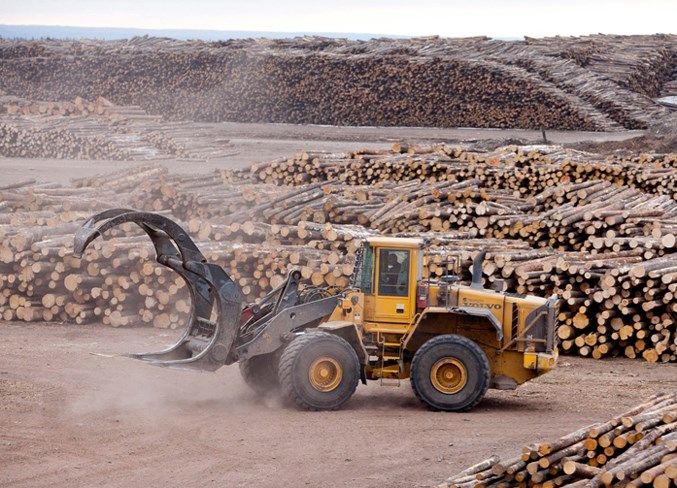If you haven’t heard, B.C. is reeling from the shock of forestry mill closures.
According to the B.C. government, more than 4,000 people in 27 forestry towns just like ours have lost their jobs this year due to the negative market conditions affecting their province’s forestry industry. With so much attention provided to other industries like oil and gas, you can be forgiven if you have not heard of the crisis unfolding in B.C. But you cannot afford to be unaware, because it will soon have major ramifications for Alberta’s own forestry industry.
Just last week, harvesting operations were stopped on Vancouver Island and in the Fraser Valley by the Teal-Jones Group, putting 800 people out of work.
And in Kelowna, Tolko is shuttering its mill, being forced to let go of its remaining workforce of 127.
Earlier in September, Interfor announced plans to cease operations at its sawmill in Maple Ridge, B.C., affecting 100 people and their families.
Recently, West Fraser reduced its output by putting five mills in B.C. on variable schedules. According to the B.C. Liberal Party critic for forests, John Rustad, who recently spoke about the subject on CBC Radio, production could drop by 25 per cent at these facilities.
How did this happen? It comes down to climate and economics.
Recent forest fires have wrecked huge swaths of harvestable forest. Although 2019 was a relatively good year, according to the B.C. Wildfire Service, between 2008 and 2017 the average number of hectares burned in a season was 269,702. Shockingly, the 2017 and 2018 totals were fives times this number. In 2017, more than 1.2 million hectares burned and there were more than 1.35 million hectares of burnt forest by the end of 2018. More than half of these were caused naturally through lightning. A drying, warming climate in western North America has turned forests into kindling.
Even worse, the mountain pine beetle has been a major scourge of lodgepole pine trees since the late 1990s and early 2000s when its range significantly expanded. Since then, their presence has been spreading like wildfire (to hit the point home). According to Natural Resources Canada (NRC), pine beetles have devastated more than 18 million hectares in B.C. and Alberta — equal to about 750 million cubic metres of merchantable pine volume, representing more than 50 per cent of merchantable supply.
The NRC website explains that pine beetle “populations grow when summers are warm and winters are mild,” meaning that climate is as much responsible for the pine beetle epidemic as it is for the preponderance of wild forest fires.
The combined devastation caused by pine beetles and forest fires in B.C. is a crisis. It is reducing the supply of merchantable timber, since both fires and beetles reduce the size of the annual allowable cut permitted to industry. The annual allowable cut is in place to protect the sustainable harvest of forests into the future, so it is a required metric. But with reduced annual supply, the competition for logs has driven material pricing to record levels. With current commodity lumber prices not being sufficient to offset material and production costs, milling is at overcapacity. This is why so many mills are either temporarily curtailing production or are forced to shut down.
It is imperative that Sundre — and Alberta — continue to be proactive in the fight against mountain pine beetle. The pine beetle is already present in northwestern Alberta’s eastern slopes, and if not properly managed will affect Sundre’s forest management area (FMA) within three to five years according to Bruce Alexander, general manager at West Fraser’s mill in Sundre.
Sundre is home to a large West Fraser lumber and treated wood facility. This operation is the single largest employer in the area, with 246 direct employees and 332 indirect and induced jobs in the region. The Sundre and area district relies on this employment for good paying contracts and jobs. Although the Sundre facility is well run with excellent staff, a leader in forestry management and is fortunate to see continued capital reinvestment by the company, it is not immune to the potential devastation caused by the mountain pine beetle. Just look west across the Rockies to see the potential future impacts.
 West Fraser Timber’s mill in Sundre is the community’s largest local employer.
West Fraser Timber’s mill in Sundre is the community’s largest local employer.
Alberta forestry companies are world-leading managers of forests, but the economics of climate change dictate that adaptive policies must be put in place to protect this vital sector and fight the pine beetle. We cannot afford to focus so heavily on news-heavy industries at the expense of our favourite renewable resource sector.
— Allan is the Town of Sundre's economic development officer.

